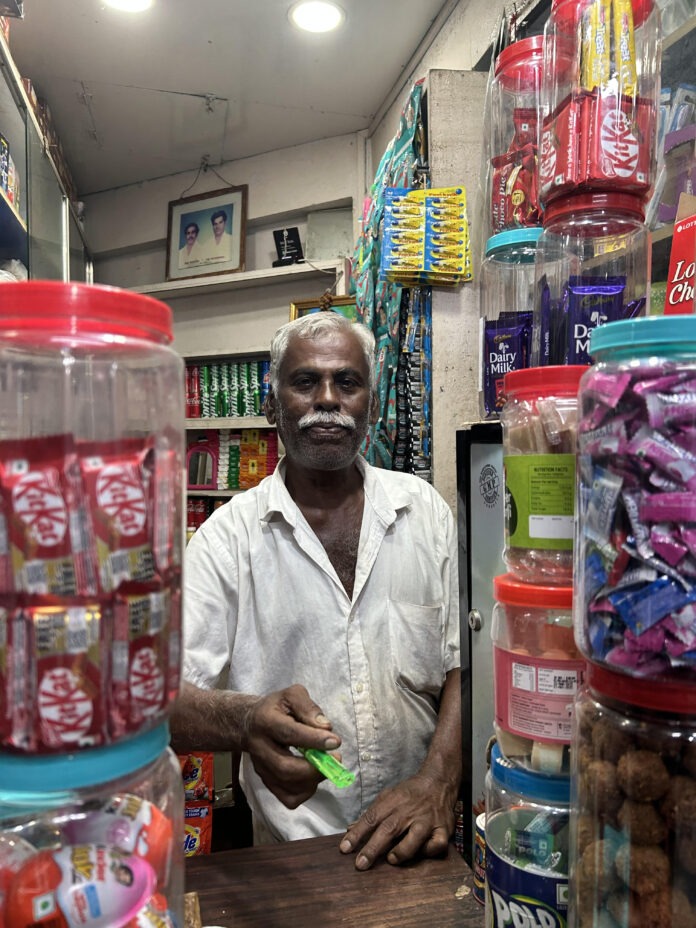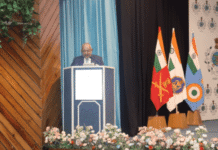In the heart of Aberdeen Bazaar, directly across from the clock tower that anchors the market’s chaos, sits a modest paan shop that has stood the test of time. Most passersby see a small business catering to daily regulars. Few realise that the man behind the counter, K. Kalimuthu Thevar, has stood not only behind this shopfront but also in front of thousands of voters, contesting six elections as an independent candidate across two states.
Originally from Rameshwaram, Kalimuthu migrated to Sri Vijaya Puram in 1972. What began as a search for work soon became a life built from scratch, defined by modest beginnings, bureaucratic resistance, and a determination to carve out dignity through self-employment. But in 1994, a series of official roadblocks and what he describes as selective treatment from departments prompted him to take a path rarely chosen by small vendors: he filed his nomination to contest elections.
His first experience with politics, he says, wasn’t born from ambition but frustration. With no party to back him, no campaign team, and little money to print posters, Kalimuthu stepped into the electoral race as a lone figure, driven purely by his belief that silence is not the answer. “I never cared about winning or losing,” he says with a knowing smile. “What mattered was that I stood up when no one else dared.”
Over the next three decades, he contested again in 1999, 2004, 2014, and 2019 from Sri Vijaya Puram, and once in 2009 from Rameshwaram. The result was never in his favour, but that was never the point. “What mattered was that I stood up,” he repeats, underscoring the quiet defiance that made him a known face, if not a victorious one, in local politics.
Despite being electorally unsuccessful, Kalimuthu earned the respect of many in the neighbourhood who saw his persistence as symbolic, an everyday citizen refusing to be ignored in a system that often favours power and money. In his shop, where he continues to work daily, the elections are now stories, not regrets.
His family has also lived the weight of his choices. Of his three sons, the middle one, an engineer, passed away several years ago. His eldest now works as a bank manager, and his youngest, who helps run the shop, remains closely involved in the daily grind and memories of his father’s campaigns. “He’s not just our father,” says the youngest son, “he’s our proof that fighting back is never a waste, no matter the odds.”
The same paan counter that helped fund their education also funded Kalimuthu’s belief in public service, however unconventional his methods may have been. His story doesn’t end in victory speeches, but in a simple truth: he kept showing up.
At an age when most retreat into retirement, Kalimuthu remains a fixture in Aberdeen’s landscape, quietly working behind the counter, still carrying the same fire. When asked what keeps him going, he replies without hesitation: “If you put your mind to something, you can do great things, no matter where you start from.”
He doesn’t speak in slogans. His language is a lived experience. For the new generation passing by his stall each day, voters, students, first-time job seekers, Kalimuthu may appear as just another vendor. But those who stop long enough may begin to see something else: a man who took on an entire system, not to win, but to remind others that participation matters.
And perhaps, in that, lies a quiet kind of victory. One that isn’t announced through loudspeakers but endures in the memory of a market lane, a ballot list, and a man who never stopped standing up.





